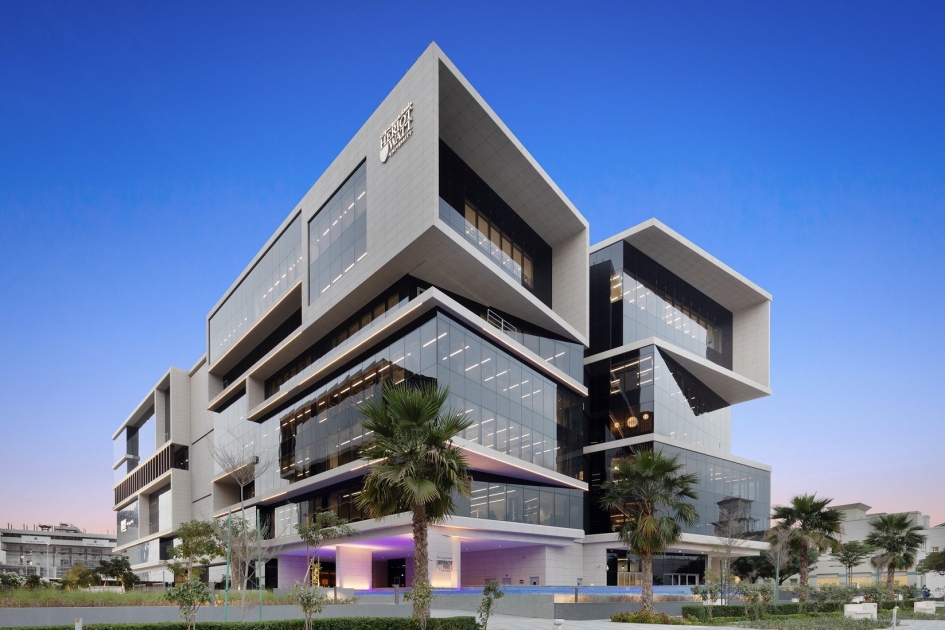
Heriot-Watt University Announces Winners of the Construction Sustainability Hackathon
Heriot-Watt University announced the winners of the recently concluded Sustainability Hackathon that brought together students and experts to address sustainability challenges in construction and the overall built environment. Held at the UK Pavillion at Expo 2020, the hackathon witnessed 78 individual applicants who presented various ideas showcasing challenges in the built environment and the potential solutions. Ten entries made it to the final round, where five emerged as winners.
The five winners, Ayodeji Tifase, Atsenokhai Apakhumhe from Nigeria, Jafar Adam from the UAE, Shubhankar Ghosh, and Ankita Gupta from India, presented ideas around the four central themes of the event: Sustainable Materials, Clean Energy Use, Smart Technologies, and Urban Developments. Each winner was presented with AED 15,000 worth of study scholarships at Heriot-Watt University.
The event was part of Heriot-Watt University’s research efforts in accelerating the agenda to decarbonise the construction industry. Currently, the Centre of Excellence in Smart Construction (CESC) at Heriot-Watt University Dubai is working with the UAE Ministry of Climate Change and Environment on the UAE cement industry decarbonisation programme. The research initially identifies the challenges preventing the decarbonisation of the cement industry before focusing on four key areas: materials and waste management, building permits and regulations, new technologies, and education.
Dr Anas Bataw, director of the Centre of Excellence in Smart Construction (CESC) at Heriot-Watt University Dubai, said, “The built environment continues to be of global concern due to the impact the construction industry has on sustainability. Around half of all non-renewable resources mankind consumes are used in construction, making it one of the least sustainable industries in the world. With the UAE’s construction sector set to grow by 3.9 per cent by 2025, it is key for the government, industry, and academia to work alongside each other to address and reduce its impact on the environment. The hackathon was a significant step towards bringing the young generation together on one platform to create solutions for environmental challenges that we witness now and will see in the future. The young minds presented impactful projects that focused on sustainable construction and building materials, embracing a low carbon future, climate crisis, and showcased current challenges and innovative solutions.”
“During the global transition to net zero, the construction sector needs to dramatically reduce the amount of carbon embedded in new infrastructure and buildings, ultimately reducing its wider impact on the environment. Through activities such as the hackathon, we can not only bring young minds together but also inspire them to be active participants in creating a more sustainable environment.”
Each project was judged based on criteria such as challenge clarity and identification, explaining the solution, value proposition and benefits to the end-user, innovation, originality, competitive advantage within a relevant industry, entrepreneurial spirit, social impact, and creativity.
Ayodeji Tifase showcased how introducing innovative sustainable materials such as fiberglass, fly ash, blast furnace slag, recycled concrete aggregates, and others can support sustainability in the built environment. Atsenokhai Apakhumhe’s project addressed waste generation in building construction and the need to accurately track construction and demolition materials, to better manage the carbon footprints of the construction industry. Atsenokhai presented the need for a decentralised blockchain database for storing the digital identity of a building that can offer insights into various factors of a building supporting recycling, recovery and reusing of materials in a more channeled manner.
Jafar Adam’s proposal addressed one of the biggest challenges of the built environment, concrete carbon emissions. Jafar presented the case for geopolymer, which is fast emerging as an alternative to traditional concrete. It fulfils the critical properties of cement but is sustainable due to its flexibility in using waste and by products in its making. Shubhankar Ghosh tackled the issue of water purification in remote locations and showcased a technical ambitious solution that uses ultraviolet radiation in eliminating biological water impurities with the use of carbon nanotubes. While Ankita Gupta successfully managed to showcase additional alternative sustainable materials that can be used in construction such as structural insulated panels and mycelium.
The students were supported by mentors and industry experts before being evaluated at the final stages of the competition. The final 10 students were judged by a distinguished panel of experts – Mohammed Hidayath, Head of Department – Sustainability at Alpin Limited, Dr. Yasemin Nielsen, Associate Professor at Heriot-Watt University Dubai, Yara Jundi, Assistant Vice President, Sustainability Procurement at Aldar, Rayya Jawhar, Sustainability Lead – Middle East at Buro Happold and Dr. Anas Bataw.
Through its continued efforts, CESC brings government, industry and academic collaboration and has unveiled a series of ambitious targets for the sector, leading to net zero emissions across the UAE’s cement industry by 2040. Partners include the UAE ministry of Climate Change and Environment, UK Department of International Trade, HSBC, Institute of Civil Engineers, American Concrete Institute and the New York University of Abu Dhabi alongside leading developers and construction experts.
In the UAE, CESC will continue to bring together the government, industry, academics and other stakeholders from the construction sector value chain to explore technologies, systems and processes to achieve the national sustainable construction sector by 2040.

























